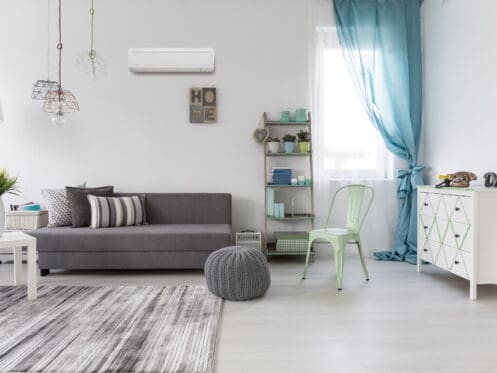As the world continues to focus on sustainability and energy efficiency, homeowners are increasingly looking for innovative ways to upgrade their homes while minimizing their carbon footprint. One such upgrade gaining popularity is replacing traditional air conditioning systems with heat pumps. Heat pumps offer an energy-efficient alternative that provides both cooling and heating capabilities, making them a versatile and eco-friendly choice for modern homes. In this blog post, we will explore the benefits of replacing your AC with a heat pump and provide valuable tips to help you navigate the transition seamlessly.
Types of Heat Pumps
Before we dive into the benefits of upgrading to a heat pump, let’s briefly look at the different types of heat pumps on the market.
Air-Source Heat Pumps
These heat pumps extract heat from the outdoor air, making them the most common type. They are available in both air-to-air and air-to-water configurations.
Ground-Source (Geothermal) Heat Pumps
These heat pumps use the relatively stable temperature of the ground or water as a heat source or sink. They are highly efficient but can be more expensive to install due to the need for underground loops.
Water-Source Heat Pumps
These heat pumps extract heat from a water source, such as a pond, lake, or well. This is a good option for households that are in close proximity to a water source.
The Benefits of Heat Pumps
Replacing your traditional air conditioning (AC) system with a heat pump offers a plethora of benefits that go beyond mere temperature control. Let’s delve deeper into these advantages to understand why making the switch to a heat pump is a wise and environmentally conscious decision.
Energy Efficiency and Cost Savings
Unlike traditional AC units that generate cool air by consuming electricity, heat pumps transfer heat between indoor and outdoor spaces. This means they use significantly less energy to achieve the same cooling effect, resulting in lower utility bills. In fact, some homeowners report savings of up to 40% on their energy expenses after installing a heat pump. While the initial investment may be higher, the long-term cost savings make it a financially savvy choice.
Dual-Functionality
One of the standout benefits of heat pumps is their ability to both cool and heat your home. This dual-functionality eliminates the need for separate heating systems, simplifying your home’s HVAC setup and saving valuable space. Whether you need warmth during chilly winters or cooling relief on sweltering summer days, a heat pump has you covered year-round.
Reduced Environmental Impact
In an era where environmental sustainability is of paramount importance, heat pumps shine as an eco-friendly HVAC solution. By extracting heat from the air, ground, or water sources, they consume far less energy and produce fewer greenhouse gas emissions compared to traditional heating and cooling systems. By choosing a heat pump, you actively contribute to reducing your carbon footprint and helping combat climate change.
Consistent Indoor Comfort
Heat pumps are designed to maintain a consistent indoor temperature, ensuring your comfort throughout the year. Unlike some traditional heating systems that can lead to temperature fluctuations and drafts, heat pumps deliver even and balanced heating and cooling.This results in a more pleasant and enjoyable living environment for you and your family.
Improved Air Quality
Heat pumps not only regulate temperature but also play a role in enhancing indoor air quality. They dehumidify the air as they operate, reducing moisture levels that can lead to mold growth and allergen proliferation. Furthermore, many heat pump models come equipped with advanced air filtration systems that capture dust, pollen, and other particles, providing cleaner and healthier air for your home.
Quiet Operation
Heat pumps are known for their quiet operation, making them an excellent choice for homes where peace and tranquility are valued. Unlike noisy AC units that can disrupt your peace and quiet, heat pumps operate at lower noise levels, allowing you to enjoy a serene living space.
Longevity and Durability
Heat pumps are built to last, with an average lifespan of 15 to 20 years or more when properly maintained. This longevity makes them a reliable investment that will serve your home comfort needs for many years, minimizing the need for frequent replacements and reducing waste.
Low Maintenance Requirements
Heat pumps require relatively low maintenance compared to some other HVAC systems. Regular tasks such as cleaning or replacing filters, checking refrigerant levels, and scheduling professional inspections help keep your heat pump in optimal condition. With proper care, your heat pump will continue to operate efficiently and effectively.
Remote Control and Smart Technology Integration
Many modern heat pump models come with advanced features such as programmable thermostats and remote control capabilities. This allows you to adjust settings and monitor your HVAC system remotely, ensuring your home is at the ideal temperature before you arrive. Some heat pumps also integrate with smart home technology, providing you with even greater control over your indoor climate.
What Should You Know Before Switching to a Heat Pump
Conduct a Comprehensive Assessment
Before making the switch, it’s essential to assess your home’s heating and cooling needs. Factors to consider include your region’s climate, insulation, and the size of your living space. Consulting with a professional HVAC technician can help you determine the right heat pump size and type for your home.
Choose the Right Type of Heat Pump
Heat pumps come in various types, including air-source, ground-source (geothermal), and water-source. Every option has their own strengths and drawbacks. Air-source heat pumps are the most common and cost-effective, while geothermal systems offer superior efficiency but require a higher initial investment. Research each type thoroughly to decide which one aligns best with your budget and preferences.
Seek Professional Installation
Proper installation is crucial to ensure your heat pump functions optimally. Enlist the services of a certified HVAC technician experienced in heat pump installations. A professional will ensure proper sizing, placement, and integration with your existing ductwork or heating system.
Upgrade Insulation and Sealing
To maximize the efficiency of your new heat pump system, consider upgrading insulation and sealing any air leaks in your home. Adequate insulation and a well-sealed building envelope help maintain a consistent indoor temperature, reducing the workload on your heat pump.
Explore Available Incentives
Many governments and utility companies offer incentives and rebates for homeowners who install energy-efficient heating and cooling systems, including heat pumps. Research available programs in your area to take advantage of potential financial benefits.
Understand Maintenance Requirements
Like any HVAC system, heat pumps require regular maintenance to ensure optimal performance. Establish a maintenance schedule with your HVAC professional to keep your heat pump running smoothly and extend its lifespan.
Learn How to Operate Your Heat Pump
Familiarize yourself with your new heat pump’s operation and settings. Modern heat pumps often come with programmable thermostats and advanced features. Learning how to use these features effectively can help you optimize your home’s comfort and energy efficiency.
Upgrade Your Home’s HVAC System Today!
Replacing your AC with a heat pump is a smart choice for homeowners seeking to reduce their energy consumption, lower utility bills, and minimize their environmental impact. By carefully assessing your home’s needs, selecting the right type of heat pump, and enlisting the expertise of HVAC professionals, you can seamlessly transition to this eco-friendly and versatile heating and cooling solution.
If you are ready to make the change, contact First Choice Plumbing, Heating & Air Conditioning today to schedule your heat pump installation or to learn more information about your heating options!




